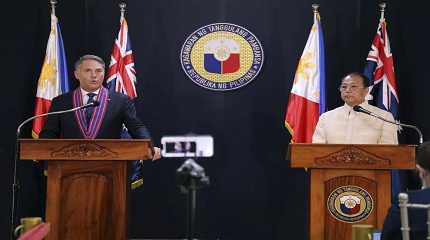
MANILA, Philippines (AP) — The Philippines is in talks with the United States as well as Australia on future joint patrols in the South China Sea, where China’s increasingly aggressive actions in the disputed waters are causing concern, top defense officials in the three nations said Wednesday.
U.S. Defense Secretary Lloyd Austin called his Philippine counterpart, Carlito Galvez Jr., to reiterate Washington’s support and commitment to help defend its oldest treaty ally in Asia after a Chinese coast guard aimed a military-grade laser at a Philippine patrol vessel near a disputed shoal.
The Feb. 6 incident off Second Thomas Shoal briefly blinded some of the Filipino crew and prompted Manila to file a strongly worded diplomatic protest. President Ferdinand Marcos Jr. also summoned China’s ambassador to express his concern.
“The two leaders discussed proposals to deepen operational cooperation and enhance the United States and the Philippines’ shared security, including the recent decision to resume combined maritime activities in the South China Sea,” according to details of the phone conversation provided by Pentagon press secretary Brig. Gen. Pat Ryder.
During Austin’s visit to Manila this month, Galvez and U.S. officials had said the allies agreed to carry out joint patrols.
Separately, Galvez and visiting Australian Defense Minister Richard Marles said in a news conference on Wednesday that they were looking at Australian and Philippine forces possibly carrying out their joint patrols in the busy waterway.
As countries asserting the rule of law, including the 1982 U.N. Convention on the Law of the Sea, in the South China Sea, where a bulk of Australia’s trade traverses, “we did talk today about the possibility of exploring joint patrols,” Marles said, without elaborating.
Australian and Philippine forces have undertaken joint patrols off the southern Philippines in the past to counter terrorist threats, Galvez said, and added, “We can do it again.”
Aside from the United States, Australia is the only other country that struck a defense agreement with the Philippines for joint combat exercises in the country. The Philippine Constitution prohibits the permanent basing of foreign troops and their involvement in local combat.
Austin announced after meeting Marcos on Feb. 2 that the Philippines had approved an expanded U.S. military presence by allowing rotating batches of U.S. forces to stay in four more Philippine military camps, in addition to five others.
It was the latest move by the Biden administration to strengthen an arc of military alliances in the Indo-Pacific to better counter China, including in any future confrontation over Taiwan.
Austin reaffirmed in his talk with Galvez on Wednesday the U.S. Defense Department’s “commitment to bolstering the Philippines’ defense capabilities and capacity to resist coercion as the allies develop a security-sector assistance roadmap.” No details of the mutual security plan were immediately provided.
China opposes military activities involving the U.S. and its allies, especially in the South China Sea, and has warned Washington not to meddle in what it says is a purely Asian dispute.
Chinese forces have protested the presence of U.S. Navy ships and fighter jets that have been enforcing freedom of movement in the contested waters. The U.S. military insists it would exercise its rights under international law to sail and fly in international waters.
In Jakarta, visiting Chinese Foreign Minister Qin Gang said on Wednesday that China would work with the Association of Southeast Asian Nations, which is currently led by Indonesia, to hasten negotiations on a proposed nonaggression pact, which is designed to avoid armed confrontations in the South China Sea.
“China and Indonesia will work with other ASEAN countries to … accelerate consultations on a code of conduct in the South China Sea, and jointly maintain the peace and stability in the South China Sea fully and effectively.” Gang said in an online press conference.
The highly secretive talks between China and the 10-nation ASEAN, whose four members are locked in territorial conflicts with Beijing over the strategic waterway, have faced years of delay, including during the height of the coronavirus pandemic.
China and the regional bloc have agreed to speed up the negotiations this year but it’s unclear how they can overcome key differences, including which areas should be covered by the pact and whether the agreement should be legally binding.




